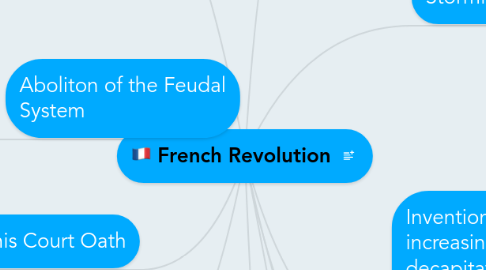
1. Troubled Economy- France was in a major economic depression from 1787-1789. This resulted in a loss employment to alot of people and also crops were highly damaged. The government system was very awkward.
2. The Three Estates
2.1. The First Estate was religious, had 100,000 members. In the First Estate there were also classes like the Upper Clergy that would be Bishops and Abbots.
2.2. The Second Estate had the nobility people in it. With this there was around 400,000 people. They were the rich and had nice houses and clothes.
2.3. The Third Estate had around 25,000,000 people. Includes the richest men in France that were bankers and Financers.
3. The Tennis Court Oath
3.1. Never to separate until a constitution was granted
4. Aboliton of the Feudal System
4.1. In 1789, the National Assembly got rid of the Estates-General, which granted them legislative power in France.
5. Napoleon
5.1. Napoleon Bonaparte Leads a successful coup against the French Republic and becomes Leader of France in 1799
5.1.1. Napoleon was approached to organize a coup against the government of France
5.1.2. Napoleon had more ambitious plans. He manipulated the situation and was elected First counsul, the new leader of France
5.2. Napoleon Is Declared Emperor of France in 1804
5.2.1. Napoleons success in reforming France and expanding French influence throughout the country made him very popular with the people.
5.2.2. He crowned himself Emporer of France.
5.2.3. France was reinvented as an empire, and Napoleon Bonaparte was crowned Frances first Emperor in 1804
5.3. Napleon Builds his Empire from 1804-1814
5.3.1. Napoleon expanded French control and influence well beyond the countrys borders.
5.3.2. As part of the strategies to expand his empire , he placed his brothers on the thrones of Spain and the Kingdom of Italy.
5.3.3. He created the Napoleonic Code which became the basis for the legal systems of many European countries
5.4. Napoleons Empire at War and the Continental System
5.4.1. Napoleon expanded his empire by claiming territories on behalf of France
5.4.2. Naploeon had economic dispuits with Britain.
5.4.3. In response to Britains funding of military efforts against his empire, Napoleon created the Continental System, an embargo prohibiting his allies and territories within his empire from trading with Britain.
5.5. The Hundred Days and the Battle of Waterloo
5.5.1. June 1815- Napoleon was exiled to Elba, during which time Louis XVIII regained his title as monarch of France. Eventually, Napoleon returned and once again became ruler of France for a period of time known as "The Hundred Days". He was again defeated and exiled to St. Helena, where he died six years later.

